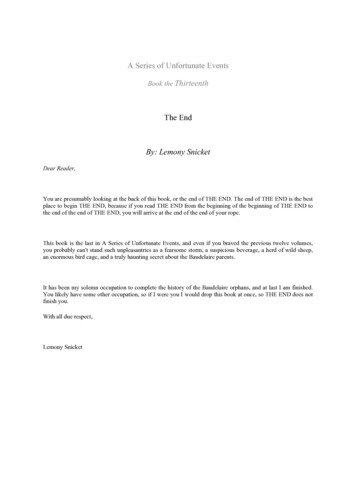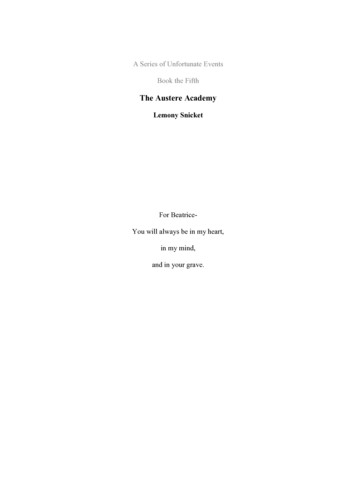
Transcription
A Series of Unfortunate EventsBook the ThirteenthThe EndBy: Lemony SnicketDear Reader,You are presumably looking at the back of this book, or the end of THE END. The end of THE END is the bestplace to begin THE END, because if you read THE END from the beginning of the beginning of THE END tothe end of the end of THE END, you will arrive at the end of the end of your rope.This book is the last in A Series of Unfortunate Events, and even if you braved the previous twelve volumes,you probably can't stand such unpleasantries as a fearsome storm, a suspicious beverage, a herd of wild sheep,an enormous bird cage, and a truly haunting secret about the Baudelaire parents.It has been my solemn occupation to complete the history of the Baudelaire orphans, and at last I am finished.You likely have some other occupation, so if I were you I would drop this book at once, so THE END does notfinish you.With all due respect,Lemony Snicket
For Beatrice —I cherished, you perished,The world's been nightmarished.
TABLE OF CONTENTSCHAPTER OneCHAPTER TwoCHAPTER ThreeCHAPTER FourCHAPTER FiveCHAPTER SIXCHAPTER SevenCHAPTER EightCHAPTER NineCHAPTER TenCHAPTER ElevenCHAPTER TwelveCHAPTER ThirteenCHAPTER Fourteen
CHAPTEROneIf you have ever peeled an onion, then you know that the first thin, papery layer revealsanother thin, papery layer, and that layer reveals another, and another, and before you know ityou have hundreds of layers all over the kitchen table and thousands of tears in your eyes,sorry that you ever started peeling in the first place and wishing that you had left the onionalone to wither away on the shelf of the pantry while you went on with your life, even if thatmeant never again enjoying the complicated and overwhelming taste of this strange and bittervegetable.In this way, the story of the Baudelaire orphans is like an onion, and if you insist onreading each and every thin, papery layer in A Series of Unfortunate Events, your onlyreward will be 170 chapters of misery in your library and countless tears in your eyes. Even ifyou have read the first twelve volumes of the Baudelaires' story, it is not too late to stoppeeling away the layers, and to put this book back on the shelf to wither away while you readsomething less complicated and overwhelming. The end of this unhappy chronicle is like itsbad beginning, as each misfortune only reveals another, and another, and another, and onlythose with the stomach for this strange and bitter tale should venture any farther into theBaudelaire onion. I'm sorry to tell you this, but that is how the story goes.The Baudelaire orphans would have been happy to see an onion, had one come bobbingalong as they traveled across the vast and empty sea in a boat the size of a large bed but notnearly as comfortable. Had such a vegetable appeared, Violet, the eldest Baudelaire, wouldhave tied up her hair in a ribbon to keep it out of her eyes, and in moments would haveinvented a device to retrieve the onion from the water. Klaus, the middle sibling and the onlyboy, would have remembered useful facts from one of the thousands of books he had read,and been able to identify which type of onion it was, and whether or not it was edible. AndSunny, who was just scarcely out of babyhood, would have sliced the onion into bite-sizedpieces with her unusually sharp teeth, and put her newly developed cooking skills to good usein order to turn a simple onion into something quite tasty indeed. The elder Baudelaires couldimagine their sister announcing "Soubise!" which was her way of saying "Dinner is served."But the three children had not seen an onion. Indeed, they had not seen much of anythingduring their ocean voyage, which had begun when the Baudelaires had pushed the large,wooden boat off the roof of the Hotel Denouement in order to escape from the fire engulfingthe hotel, as well as the authorities who wanted to arrest the children for arson and murder.The wind and tides had quickly pushed the boat away from the burning hotel, and by sunsetthe hotel and all the other buildings in the city were a distant, faraway blur. Now, thefollowing morning, the only things the Baudelaires had seen were the quiet, still surface ofthe sea and the gray gloom of the sky. The weather reminded them of the day at Briny Beachwhen the Baudelaires had learned of the loss of their parents and their home in a terrible fire,and the children spent much of their time in silence, thinking about that dreadful day and allof the dreadful days that had followed. It almost would have been peaceful to sit in a driftingboat and think about their lives, had it not been for the Baudelaires' unpleasant companion.
Their companion's name was Count Olaf, and it had been the Baudelaire orphans'misfortune to be in this dreadful man's company since they had become orphans and he hadbecome their guardian. Olaf had hatched scheme after scheme in an attempt to get his filthyhands on the enormous fortune the Baudelaire parents had left behind, and although eachscheme had failed, it appeared as if some of the villain's wickedness had rubbed off on thechildren, and now Olaf and the Baudelaires were all in the same boat. Both the children andthe count were responsible for a number of treacherous crimes, although at least theBaudelaire orphans had the decency to feel terrible about this, whereas all Count Olaf hadbeen doing for the past few days was bragging about it."I've triumphed!" Count Olaf reiterated, a word which here means "announced for theumpteenth time." He stood proudly at the front of the boat, leaning against a carving of anoctopus attacking a man in a diving suit that served as the boat's figurehead. "You orphansthought you could escape me, but at last you're in my clutches!""Yes, Olaf," Violet agreed wearily. The eldest Baudelaire did not bother to point out thatas they were all alone in the middle of the ocean, it was just as accurate to say that Olaf wasin the Baudelaires' clutches as it was to say they were in his. Sighing, she gazed up at the tallmast of the boat, where a tattered sail drooped limply in the still air. For some time, Violethad been trying to invent a way for the boat to move even when there wasn't any wind, butthe only mechanical materials on board were a pair of enormous spatulas from the HotelDenouement's rooftop sunbathing salon. The children had been using these spatulas as oars,but rowing a boat is very hard work, particularly if one's traveling companions are too busybragging to help out, and Violet was trying to think of a way they might move the boat faster."I've burned down the Hotel Denouement," Olaf cried, gesturing dramatically, "anddestroyed V.F.D. once and for all!""So you keep telling us," Klaus muttered, without looking up from his commonplacebook.For quite some time, Klaus had been writing down the details of the Baudelaires' situationin this dark blue notebook, including the fact that it was the Baudelaires, not Olaf, who hadburned down the Hotel Denouement. V.F.D. was a secret organization that the Baudelaireshad heard about during their travels, and as far as the middle Baudelaire knew it had not beendestroyed—not quite—although quite a few V.F.D. agents had been in the hotel when itcaught fire. At the moment, Klaus was examining his notes on V.F.D. and the schism, whichwas an enormous fight involving all of its members and had something to do with a sugarbowl. The middle Baudelaire did not know what the sugar bowl contained, nor did he knowthe precise whereabouts of one of the organization's bravest agents, a woman named KitSnicket. The children had met Kit only once before she headed out to sea herself, planning tomeet up with the Quagmire triplets, three friends the Baudelaires had not seen in quite sometime who were traveling in a self-sustaining hot air mobile home. Klaus was hoping the notesin his commonplace book would help him figure out exactly where they might be, if hestudied them long enough."And the Baudelaire fortune is finally mine!" Olaf cackled. "Finally, I am a very wealthyman, which means everybody must do what I say!"
"Beans," Sunny said. The youngest Baudelaire was no longer a baby, but she still talked ina somewhat unusual way, and by "beans" she meant something like, "Count Olaf is spoutingpure nonsense," as the Baudelaire fortune was not to be found in the large, wooden boat, andso could not be said to belong to anyone. But when Sunny said "beans," she also meant"beans." One of the few things the children had found on board the boat was a large clay jarwith a rubber seal, which had been wedged underneath one of the boat's wooden benches.The jar was quite dusty and looked very old, but the seal was intact, a word which here means"not broken, so the food stored inside was still edible." Sunny was grateful for the jar, asthere was no other food to be found on board, but she couldn't help wishing that it hadcontained something other than plain white beans. It is possible to cook a number of deliciousdishes with white beans—the Baudelaire parents used to make a cold salad of white beans,cherry tomatoes, and fresh basil, all mixed together with lime juice, olive oil, and cayennepepper, which was a delicious thing to eat on hot days— but without any other ingredients,Sunny had only been able to serve her boat mates handfuls of a bland, white mush, enough tokeep them alive, but certainly nothing in which a young chef like herself could take pride. AsCount Olaf continued to brag, the youngest Baudelaire was peering into the jar, wonderinghow she could make something more interesting out of white beans and nothing else."I think the first thing I'll buy for myself is a shiny new car!" Count Olaf said. "Somethingwith a powerful engine, so I can drive faster than the legal limit, and an extra-thick bumper,so I can ram into people without getting all scratched up! I'll name the car Count Olaf, aftermyself, and whenever people hear the squeal of brakes they'll say, 'Here comes Count Olaf!'Orphans, head for the nearest luxury car dealership!"The Baudelaires looked at one another. As I'm sure you know, it is unlikely for a cardealership to be found in the middle of the ocean, although I have heard of a rickshawsalesman who does business in a grotto hidden deep in the Caspian Sea. It is very tiresome totravel with someone who is constantly making demands, particularly if the demands are forutterly impossible things, and the children found that they could no longer hold their tongues,a phrase which here means "keep from confronting Olaf about his foolishness.""We can't head for a car dealership," Violet said. "We can't head anywhere. The wind hasdied out, and Klaus and I are exhausted from rowing.""Laziness is no excuse," Olaf growled. "I'm exhausted from all my schemes, but you don'tsee me complaining.""Furthermore," Klaus said, "we have no idea where we are, and so we have no idea whichdirection to go in.""I know where we are," Olaf sneered. "We're in the middle of the ocean.""Beans," Sunny said."I've had enough of your tasteless mush!" Olaf snarled. "It's worse than that salad yourparents used to make! All in all, you orphans are the worst henchmen I've ever acquired!""We're not your henchmen!" Violet cried. "We simply happen to be traveling together!"
"I think you're forgetting who the captain is around here," Count Olaf said, and knockedone dirty knuckle against the boat's figurehead. With his other hand, he twirled his harpoongun, a terrible weapon that had one last sharp harpoon available for his treacherous use. "Ifyou don't do what I say, I'll break open this helmet and you'll be doomed."The Baudelaires looked at the figurehead in dismay. Inside the helmet were a few sporesof the Medusoid Mycelium, a terrible fungus that could poison anyone who breathed it in.Sunny would have perished from the mushroom's deadly power not so long ago, had theBaudelaires not managed to find a helping of wasabi, a Japanese condiment that diluted thepoison."You wouldn't dare release the Medusoid Mycelium," Klaus said, hoping he soundedmore certain than he felt. "You'd be poisoned as quickly as we would.""Equivalent flotilla," Sunny said sternly to the villain."Our sister's right," Violet said. "We're in the same boat, Olaf. The wind has died down,we have no idea which way to go, and we're running low on nourishment. In fact, without adestination, a way of navigating, and some fresh water, we're likely to perish in a matter ofdays. You might try to help us, instead of ordering us around."Count Olaf glared at the eldest Baudelaire, and then stalked to the far end of the boat."You three figure out a way to get us out of here," he said, "and I'll work on changing thenameplate of the boat. I don't want my yacht called Carmelita anymore."The Baudelaires peered over the edge of the boat, and noticed for the first time anameplate attached to the rear of the boat with thick tape. On the nameplate, written in amessy scrawl, was the word "Carmelita," presumably referring to Carmelita Spats, a nastyyoung girl whom the Baudelaires had first encountered at a dreadful school they were forcedto attend, and who later had been more or less adopted by Count Olaf and his girlfriend EsméSqualor, whom the villain had abandoned at the hotel. Putting down the harpoon gun, CountOlaf began to pick at the tape with his dirt-encrusted fingernails, peeling away at thenameplate to reveal another name underneath. Although the Baudelaire orphans did not careabout the name of the boat they now called home, they were grateful that the villain hadfound something to do with his time so they could spend a few minutes talking amongthemselves."What can we do?" Violet whispered to her siblings. "Do you think you can catch somefish for us to eat, Sunny?"The youngest Baudelaire shook her head. "No bait," she said, "and no net. Deep-seadive?""I don't think so," Klaus said. "You shouldn't be swimming down there without the properequipment. There are all sorts of sinister things you could encounter."The Baudelaires shivered, thinking of something they had encountered while on board asubmarine called the Queequeg. All the children had seen was a curvy shape on a radarscreen that resembled a question mark, but the captain of the submarine had told them that it
was something even worse than Olaf himself. "Klaus is right," Violet said. "You shouldn'tswim down there. Klaus, is there anything in your notes that might lead us to the others?"Klaus shut his commonplace book and shook his head. "I'm afraid not," he said. "Kit toldus she was going to contact Captain Widdershins and meet him at a certain clump ofseaweed, but even if we knew exactly which clump she meant, we wouldn't know how to getthere without proper navigation equipment.""I could probably make a compass," Violet said. "All I need is a small piece of magnetizedmetal and a simple pivot. But maybe we shouldn't join the other volunteers. After all, we'vecaused them a great deal of trouble.""That's true," Klaus admitted. "They might not be happy to see us, particularly if we hadCount Olaf along."Sunny looked at the villain, who was still scraping away at the nameplate. "Unless," shesaid.Violet and Klaus shared a nervous glance. "Unless what?" Violet asked.Sunny was silent for a moment, and looked down at the concierge uniform she was stillwearing from her time at the hotel. "Push Olaf overboard," she whispered.The elder Baudelaires gasped, not just because of what Sunny had said but because theycould easily picture the treacherous act Sunny had described. With Count Olaf overboard, theBaudelaires could sail someplace without the villain's interference, or his threats to releasethe Medusoid Mycelium. There would be one fewer person with whom to share theremaining beans, and if they ever reached Kit Snicket and the Quagmires they wouldn't haveOlaf along. In uneasy silence they turned their gazes to the back of the boat, where Olaf wasleaning over to peel off the nameplate. All three Baudelaires could imagine how simple itwould be to push him, just hard enough for the villain to lose his balance and topple into thewater."Olaf wouldn't hesitate to throw us overboard," Violet said, so quietly her siblings couldscarcely hear her. "If he didn't need us to sail the boat, he'd toss us into the sea.""V.F.D. might not hesitate, either," Klaus said."Parents?" Sunny asked.The Baudelaires shared another uneasy glance. The children had recently learned anothermysterious fact about their parents and their shadowy past—a rumor concerning their parentsand a box of poison darts. Violet, Klaus, and Sunny, like all children, had always wanted tobelieve the best about their parents, but as time went on they were less and less sure. Whatthe siblings needed was a compass, but not the sort of compass Violet had mentioned. Theeldest Baudelaire was talking about a navigational compass, which is a device that allows aperson to tell you the proper direction to travel in the ocean. But the Baudelaires needed amoral compass, which is something inside a person, in the brain or perhaps in the heart, thattells you the proper thing to do in a given situation. A navigational compass, as any goodinventor knows, is made from a small piece of magnetized metal and a simple pivot, but the
ingredients in a moral compass are not as clear. Some believe that everyone is born with amoral compass already inside them, like an appendix, or a fear of worms. Others believe thata moral compass develops over time, as a person learns about the decisions of others byobserving the world and reading books. In any case, a moral compass appears to be a delicatedevice, and as people grow older and venture out into the world, it often becomes more andmore difficult to figure out which direction one's moral compass is pointing, so it is harderand harder to figure out the proper thing to do. When the Baudelaires first encountered CountOlaf, their moral compasses never would have told them to get rid of this terrible man,whether by pushing him out of his mysterious tower room or running him over with his long,black automobile. But now, standing on the Carmelita, the Baudelaire orphans were not surewhat they should do with this villain who was leaning so far over the boat that one small pushwould have sent him to his watery grave.But as it happened, Violet, Klaus, and Sunny did not have to make this decision, becauseat that instant, as with so many instants in the Baudelaire lives, the decision was made forthem, as Count Olaf straightened up and gave the children a triumphant grin. "I'm a genius!"he announced. "I've solved all of our problems! Look!"The villain gestured behind him with one thick thumb, and the Baudelaires peered over theedge of the boat and saw that the CARMELITA nameplate had been removed, revealing anameplate reading COUNT OLAF, although this nameplate, too, was attached with tape, andit appeared that yet another name-plate was underneath this one. "Renaming the boat doesn'tsolve any of our problems," Violet said wearily."Violet is right," Klaus said. "We still need a destination, a way of navigating, and somekind of nourishment.""Unless," Sunny said, but Count Olaf interrupted the youngest Baudelaire with a slychuckle."You three are really quite slow-witted," the villain said. "Look at the horizon, you fools,and see what is approaching! We don't need a destination or a way of navigating, becausewe'll go wherever it takes us! And we're about to get more fresh water than we could drink ina lifetime!"The Baudelaires looked out at the sea, and saw what Olaf was talking about. Spillingacross the sky, like ink staining a precious document, was an immense bank of black clouds.In the middle of the ocean, a fierce storm can arrive out of nowhere, and this storm promisedto be very fierce indeed—much fiercer than Hurricane Herman, which had menaced theBaudelaires some time ago during a voyage across Lake Lachrymose that ended in tragedy.Already the children could see the thin, sharp lines of rain falling some distance away, andhere and there the clouds flickered with furious lightning."Isn't it wonderful?" Count Olaf asked, his scraggly hair already fluttering in theapproaching wind. Over the villain's nefarious chuckle the children could hear the sound ofapproaching thunder. "A storm like this is the answer to all your whining.""It might destroy the boat," Violet said, looking nervously up at the tattered sails. "A boatof this size is not designed to withstand a heavy storm."
"We have no idea where it will take us," Klaus said. "We could end up even further fromcivilization.""All overboard," Sunny said.Count Olaf looked out at the horizon again, and smiled at the storm as if it were an oldfriend coming to visit. "Yes, those things might happen," he said with a wicked smile. "Butwhat are you going to do about it, orphans?"The Baudelaires followed the villain's gaze to the storm. It was difficult to believe that justmoments ago the horizon had been empty, and now this great black mass of rain and windwas staining the sky as it drew closer and closer. Violet, Klaus, and Sunny could do nothingabout it. An inventing mind, the notes of a researcher, and surprisingly adept cooking skillswere no match for what was coming. The storm clouds unfurled wider and wider, like thelayers of an onion unpeeling, or a sinister secret becoming more and more mysterious.Whatever their moral compass told them about the proper thing to do, the Baudelaire orphansknew there was only one choice in this situation, and that was to do nothing as the stormengulfed the children and the villain as they stood together in the same boat.It is useless for me to describe to you how terrible Violet, Klaus, and even Sunny felt inthe hours that followed. Most people who have survived a storm at sea are so shaken by theexperience that they never want to speak of it again, and so if a writer wishes to describe astorm at sea, his only method of research is to stand on a large, wooden boat with a notebookand pen, ready to take notes should a storm suddenly strike. But I have already stood on alarge, wooden boat with a notebook and pen, ready to take notes should a storm suddenlystrike, and by the time the storm cleared I was so shaken by the experience that I neverwanted to speak of it again. So it is useless for me to describe the force of the wind that torethrough the sails as if they were paper, and sent the boat spinning like an ice-skater showingoff. It is impossible for me to convey the volume of rain that fell, drenching the Baudelairesin freezing water so their concierge uniforms clung to them like an extra layer of soaked andicy skin. It is futile for me to portray the streaks of lightning that clattered down from theswirling clouds, striking the mast of the boat and sending it toppling into the churning sea. Itis inadequate for me to report on the deafening thunder that rang in the Baudelaires' ears, andit is superfluous for me to recount how the boat began to tilt back and forth, sending all of itscontents tumbling into the ocean: first the jar of beans, hitting the surface of the water with aloud glop!, and then the spatulas, the lightning reflecting off their mirrored surfaces as theydisappeared into the swirling tides, and lastly the sheets Violet had taken from the hotellaundry room and fashioned into a drag chute so the boat would survive its drop from therooftop sunbathing salon, billowing in the stormy air like jellyfish before sinking into the sea.
It is worthless for me to specify the increasing size of the waves rising out of water, first likeshark fins, and then like tents, and then finally like glaciers, their icy peaks climbing higherand higher until they finally came crashing down on the soaked and crippled boat with anunearthly roar like the laughter of some terrible beast. It is bootless for me to render anaccount of the Baudelaire orphans clinging to one another in fear and desperation, certain thatat any moment they would be dragged away and tossed to their watery graves, while CountOlaf clung to the harpoon gun and the wooden figurehead, as if a terrible weapon and adeadly fungus were the only things he loved in the world, and it is of no earthly use toprovide a report on the front of the figurehead detaching from the boat with a deafeningcrackle, sending the Baudelaires spinning in one direction and Olaf spinning in the other, orthe sudden jolt as the rest of the boat abruptly stopped spinning, and a horrible scrapingsound came from beneath the shuddering wood floor of the craft, as if a gigantic hand weregrabbing the remains of the Count Olaf from below, and holding the trembling siblings in itsstrong and steady grip. Certainly the Baudelaires did not find it necessary to wonder what hadhappened now, after all those terrible, whirling hours in the heart of the storm, but simplycrawled together to a far corner of the boat, and huddled against one another, too stunned tocry, as they listened to the sea rage around them, and heard the frantic cries of Count Olaf,wondering if he were being torn limb from limb by the furious storm, or if he, too, had foundsome strange safety, and not knowing which fate they wished upon the man who had flung somuch misfortune on the three of them. There is no need for me to describe this storm, as itwould only be another layer of this unfortunate onion of a story, and in any case by the timethe sun rose the next morning, the swirling black clouds were already scurrying away fromthe bedraggled Baudelaires, and the air was silent and still, as if the whole evening had onlybeen a ghastly nightmare.The children stood up unsteadily in their piece of the boat, their limbs aching fromclinging to one another all night, and tried to figure out where in the world they were, andhow in the world they had survived. But as they gazed around at their surroundings, theycould not answer these questions, as they had never seen anything in the world like the sightthat awaited them.At first, it appeared that the Baudelaire orphans were still in the middle of the ocean, as allthe children could see was a flat and wet landscape stretching out in all directions, fading intothe gray morning mist. But as they peered over the side of their ruined boat, the children sawthat the water was not much deeper than a puddle, and this enormous puddle was littered withdetritus, a word which here means "all sorts of strange items." There were large pieces ofwood sticking out of the water like jagged teeth, and long lengths of rope tangled into dampand complicated knots. There were great heaps of seaweed, and thousands of fish wrigglingand gaping at the sun as seabirds swooped down from the misty sky and helped themselves toa seafood breakfast. There were what looked like pieces of other boats—anchors andportholes, railings and masts, scattered every which way like broken toys—and other objectsthat might have been from the boats' cargo, including shattered lanterns, smashed barrels,soaked documents, and the ripped remains of all sorts of clothing, from top hats to rollerskates. There was an old-fashioned typewriter leaning against a large, ornate bird cage, with afamily of guppies wriggling through its keys. There was a large, brass cannon, with a largecrab clawing its way out of the barrel, and there was a hopelessly torn net caught in theblades of a propeller. It was as if the storm had swept away the entire sea, leaving all of itscontents scattered on the ocean floor."What is this place?" Violet said, in a hushed whisper. "What happened?"
Klaus took his glasses out of his pocket, where he had put them for safekeeping, and wasrelieved to see they were unharmed. "I think we're on a coastal shelf," he said. "There areplaces in the sea where the water is suddenly very shallow, usually near land. The storm musthave thrown our boat onto the shelf, along with all this other wreckage.""Land?" Sunny asked, holding her tiny hand over her eyes so she might see farther. "Don'tsee."Klaus stepped carefully over the side of the boat. The dark water only came up to hisknees, and he began to walk around the boat in careful strides. "Coastal shelves are usuallymuch smaller than this," he said, "but there must be an island somewhere close by. Let's lookfor it."Violet followed her brother out of the boat, carrying her sister, who was still quite short."Which direction do you think we should go?" she asked. "We don't want to get lost."Sunny gave her siblings a small smile. "Already lost," she pointed out."Sunny's right," Klaus said. "Even if we had a compass, we don't know where we are orwhere we are going. We might as well head in any direction at all.""Then I vote we head west," Violet said, pointing in the opposite direction of the risingsun. "If we're going to be walking for a while, we don't want the sun in our eyes.""Unless we find our concierge sunglasses," Klaus said. "The storm blew them away, butthey might have landed on the same shelf.""We could find anything here," Violet said, and the Baudelaires had walked only a fewsteps before they saw this was so, for floating in the water was one piece of detritus theywished had blown away from them forever. Floating in a particularly filthy part of the water,stretched out flat on his back with his harpoon gun leaning across one shoulder, was CountOlaf. The villain's eyes were closed underneath his one eyebrow, and he did not move. In alltheir miserable times with the count, the Baudelaires had never seen Olaf look so calm."I guess we didn't need to throw him overboard," Violet said. "The storm did it for us."Klaus leaned down to peer closer to Olaf, but the villain still did not stir. "It must havebeen terrible," he said, "to try and ride out the storm with no kind of shelter whatsoever.""Kikbucit?" Sunny asked, but at that moment Count Olaf's eyes opened and the youngestBaudelaire's question was
This book is the last in A Series of Unfortunate Events, and even if you braved the previous twelve volumes, you probably can't stand such unpleasantries as a fearsome storm, a suspicious beverage, a herd of wild sheep, an enormous bird cage, and a truly haunting secret about the Baudelaire parents.File Size: 938KBPage Count: 108










